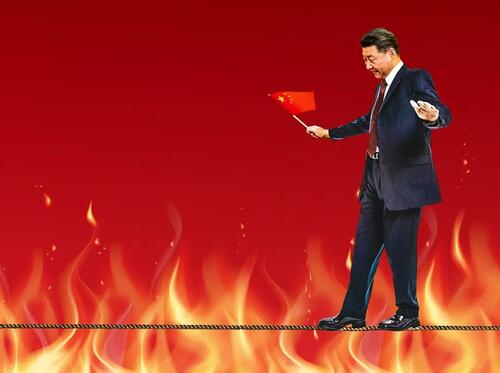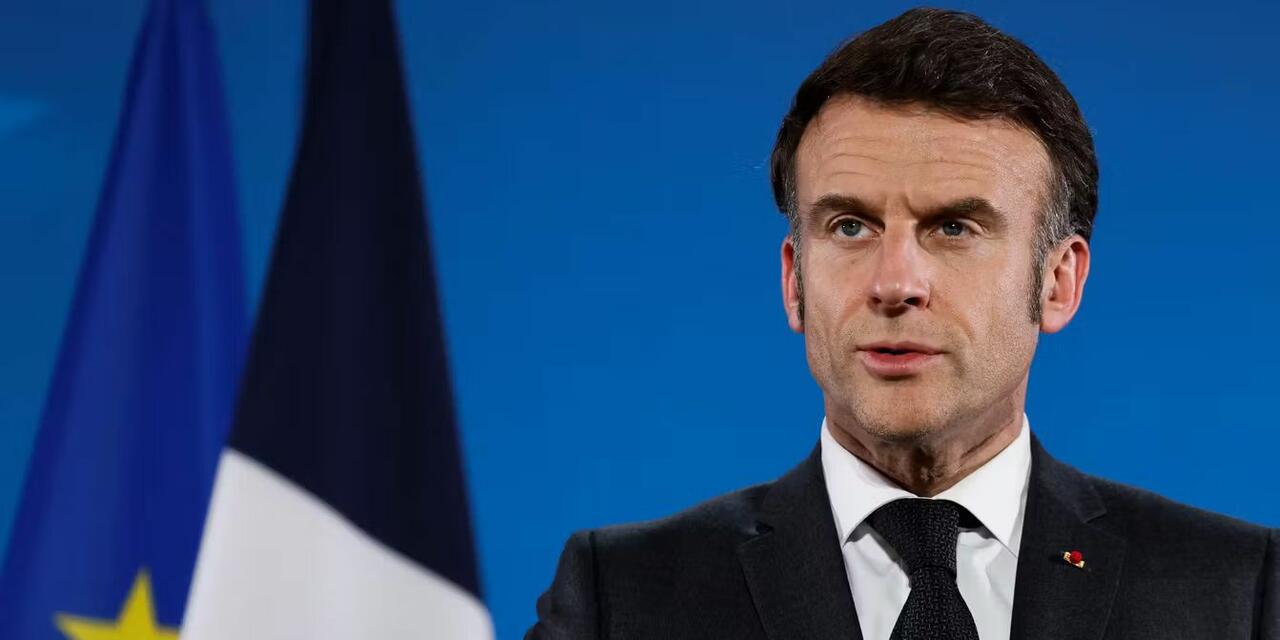I agree! As we have warned many times over the last two years, the Chinese bubble is gigantic. People expect that somehow the Chinese Central Bank will find a way to solve the problem. But what unknown weapon do the Chinese have that Western bankers know nothing about? Just asking...
Authored by Bill Blain via MorningPorridge.com,
“ All that glitters is not gold…”
The immediate threat is inflation – how could a strong CPI print destablise markets, but inflation is also a question of what shocks are still to come, and investing accordingly. What if a big No-see-Em shock is still to come – a Chinese financial crisis?
Markets are all about risk – What do we know, and what do we not? That’s easy – we know what we care to learn about the past, what we think we know about today, but about tomorrow we are just making informed guesses.
Today the big front and centre issue is inflation. Does it get worse or better, and for how long?
Take a look at any inflation chart and it will typically shows a series of sharp, short-lived spikes – which makes sense: something triggers inflation, it is addressed and the economy adapts, the price shock is normalised as the economy learns to cope with the new normal.
The immediate critical risk is another new shock; that a stronger than expected US CPI (inflation) report triggers major wobbles across markets by raising expectations of aggressive central banking rate tightening – that’s given some impetus by the comments of Bank of England governor Andrew Bailey who said :“bringing inflation down to the 2% target is our job, no ifs or buts”. The market expects a 50 bp Bank hike in early August – there is little else left in the Bank’s armoury.
The market is split on where the inflation threat goes from here:
There are naysayers who say trying to address the multiple inflation shocks now hitting global markets with recession inducing monetary tightening is just daft.
There are others who say it’s all the fault of the overly-easy monetary experimentation of artificially low-rates and QE of the last 14 years: inflation everywhere is a monetary phenomenon. (Inflation is very real and it has enormous socio-economic consequences.)
There are some market watchers who believe inflation already peaked, and June will mark a high for this inflationary spike as the economy successfully adapts and digests the Ukraine energy shock and the end of pandemic supply chain crisis. They argue there is significant resilience built in that will ease tensions.
There are others, including myself, who believe inflation could yet spike higher, and could remain persistently higher for longer than central bank dot-plots suggest. The energy crisis is not over – and could get substantially worse if Putin does not reopen the gas valves to Europe (currently closed for “maintenance”) later this month. Coronavirus lockdowns in China remain a threat to keep supply chains malfunctioning, and growing wage-inflation as industrial unrest ferments across Europe is going to hit hard in Q3/4 as recession bites.
What’s a fund manager to do? Inflation hurts earnings – as this current earnings season will no-doubt show. Interest rate rises will hit stock returns, balance sheets and prices. One argument is to buy stocks in the expectation the economy will adapt while strong fundamentals re-establish themselves.
On Monday there was a fascinating intervention on the inflation conundrum for asset managers from retired bond king Bill Gross – reminding us bonds diminish risk but lower returns.. “Jim Cramer famously says there’s always a bull market somewhere but I’m straining to find one now.” Gross goes on to say investors should mitigate the pain, accept its happening and “12 month Treasuries at 2.7% are better than your money market fund and any other alternatives!” He has a point – although others say this is time to buy duration to up the return to 3%!
On the other hand, maybe there is more pain to come? Maybe it will be Europe where Euro parity to the dollar is doing precious little to boost economies heading into a new recession, where energy security is perilous, and politics looks a-dither.
And, there are growing signs all is not well in China..
There is a widely held view Paramount Leader Chairman Xi feels so secure, and the distracted west looks so riven, it’s time for a quick operation to seize Taiwan. Maybe not – the Chinese, who share tactical doctrines with the now discredited Russian steamroller, look embarrassed by its shortcomings. For all its’ military posturing and new weapons, the Chinese are not an “outward bound” empire – historically, they prefer to internalise. The spectacular growth of China over the last 30 years has come from the internal control and expansion of its domestic economy, initially through exports and now through domestic consumption.
That’s bound to have created internal tensions – which can be seen in terms of inequality, environmental damage, and the limitations on internal freedoms – all of which we know..
But, over the last 2 years of Covid, China has effectively sequestered itself from the global economy. We think we understand how it works, but in reality… do we? Look at how dramatically and swiftly Hong Kong has been spun from being the premier western entrepot into a kow-towing domestic city.
China is big and it matters. It is like and unlike the west. It has multiple growth problems and demographics that will trigger whole new issues the West has yet to adapt to. The Covid lockdowns, understanding of the Party and government, and now bursting economic bubbles and what looks like a developing banking crisis – I’m beginning to wonder if the Middle Kingdom is more trouble than we think? If so it will have enormous global consequences – it could be a massive No-See-Um that could destabilise the global economy.
I’ve been reading up on the Chinese Banking riots in Henan Province. The fact Chinese protestors wanting money back from local banks following a run were set upon is hardly unusual – the immediate suspicion is corrupt local politicians were protecting themselves. But there are two aspects to the story to consider:
The first is Chinese Surveillance Capitalism: clamping down on reporting, using unidentified security personal to beat up and break up protestors, and local officials manipulating Covid “personal health codes” to ping protestors as likely Covid carriers takes state-control to a new level. Observers are not surprised – they saw the mandatory health codes as a way in which Government could control the masses. If surveillance capitalism is so established – why is party corruption still such an issue?
The second is the scale of the domestic banking problem. Is it really just a local, one province problem? What are we not seeing? Could it be the whole Chinese banking system is teetering?
The official line is it’s a local banking problem caused by criminality, presenting the line “local gangsters” have been systematically looting some small banks after “capturing” them up to a decade ago – which sounds like bad regulation and incompetent bank inspection. But runs on banks and lines of people asking for their money back is very 2007.
I am convinced much of the UK banking crisis following the run on Northern Rock that year would have been avoided if the Bank of England had stepped in to provide liquidity earlier. It was when the plentiful liquidity that supported bank property and corporate lending suddenly dried up as it became clear just how unbalanced that lending was that the global financial crisis was triggered.
Let me ask a rhetorical question: Is it possible China’s well known hot property bubble, it’s corporate borrowing binge, plus the high degree of corruption within the system, is fuelling a very real banking crisis in China? Is China about to suffer its’ very own internalised version of the Global Financial Crisis of 2008? How much worse will it be made by the ongoing Covid bogey being used to keep the economy under control? Are Covid Lockdowns being used to disguise the scale of a massive Chinese financial crisis?
Just asking…



No comments:
Post a Comment